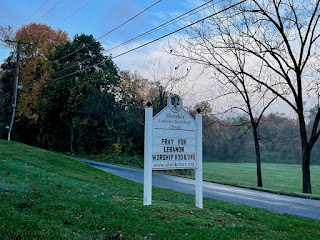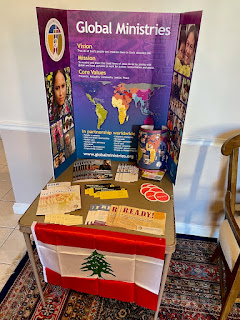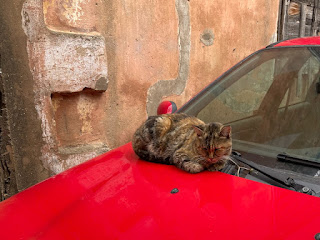Motion Sickness
One of the
constants of air travel, as well as ground travel, is the ubiquitous plastic-lined
bag for the use of those experiencing stomach discomfort while being jostled
back and forth, up and down, and side to side in the plane, boat, train, bus or
car they are in. It also helps those around them to be able to stay clean and
somewhat spared from the odor, though the poor sufferer continues to suffer
what is gently referred to as “motion sickness”.Awaiting one of our flights out of Philadelphia
(15 Oct. 2021 - Phila. Intl. Airport)
We have been experiencing a type of “motion sickness” in recent times as we completed our required home assignment and made our way back to Lebanon last week. It was an uneventful flight, except that the airplanes were crowded cheek-to-jowl with travelers, some with masks, including those going to Lebanon. Maria and I lived through five months in the U.S. and Canada of constant travel, constant packing and unpacking, constant calculations of whether the weather would be warm or cold, along with constantly arranging flight and hotel bookings, constantly working on what kind of presentation fits a particular audience, constantly trying to wrap up paperwork and follow up on unfinished tasks in the concluding weeks when we were supposed to be “resting”. Getting back home to Beirut and its daily stresses and misery afforded us a bit of respite from the previous period!
Yet it wasn’t all misery, because we
got to meet wonderful, caring people, Armenian and non-Armenian, many of whom
were aware of the trials being endured by the Lebanese and the Lebanese-Armenian
community. Hearing their questions, seeing their concern and willingness to do
something, hearing their words of blessing and being with them in God’s
presence was a gift we gratefully received. Yet it was balanced by the exhaustion
of upwards of 14,000 mi / 22,000 km of traveling (aside from the 16,000 mi /
25,000 km to actually get to the US and back)! Enviable? Perhaps. I suppose it
depends on who is doing the envying.Many ordinary people want to learn, pray and
help Lebanon. (31 Oct. 2021 - Pottstown, Pa.)
There is a TV ad that has appeared
recently on Lebanese television depicting two young Lebanese boys talking about
their dreams, which include going to school. It concludes with a voice-over stating,
“Rights should not be just dreams.” Yet the dreams of a preponderance of people
around us is not to have Lebanon become a livable country, but to leave
Lebanon for a livable country. This “exit strategy” is based on yet a
different kind of motion sickness: that of being made sick by a society that
never experiences stability, that is continually in motion due to the profit-seeking,
power struggles or whims of those in authority, whether locally, regionally or worldwide.
Getting the word out about Lebanon
(6 Nov 2021 - Belmont, Mass.)
On Beirut’s streets over the years, in my limited Arabic, I would often hear passersby including numbers in their conversations, assumedly regarding the price of this or that. How I wished that the conversations would revolve around ideas, or culture, or wonder at God’s creation! Today virtually all of the street conversations, and possibly also the private ones, are about the exchange rate, the cost of cheese and medicine, and the impossibility of carrying on in these conditions. One man at the exchange house said, “We’re living in an insane asylum!” I wish that my Arabic had not improved to the point where I could understand this much.
Economic freefall produces one kind
of motion sickness. Seeing dear friends and family members continually zoom
away from you (and I’m not referring to screen time) can produce a similar spiritual
nausea. When a family, or a community such as the Armenians, conclude that
social disintegration is the best route to take, that their children must leave
the country, then there is not much that can be said about the hopes for that
family’s (or that people’s) future. Even if you are driven by the patriotic
emotions that so often cloud Armenians’ judgment about their viability as a people,
the consequences of cultural and societal disintegration cannot be dismissed.
Many a person will insist on the necessity of laying hold, without delay, of
the “promise of a better (economic, educational, health and secure) future
elsewhere” – something that is only a promise, not a guarantee. It will apply
to some lucky individuals, but what will become of collective identity? What will
become of community? What will bring health and strength to the family, that
place where individual and collective identity is formed and nurtured? We are
in a rush toward “every man for himself”; and the shards of what was a
collective hope, a concerted effort to come together to endure hardships and grow
in character (such as was seen in the post-Genocide era), will become merely
the subject of books and articles that very few read or care to reflect upon.
Only a collective awakening to our spiritual and cultural resources can offer
us a more hopeful outcome.Exciting times on Home Assignment
(6 Dec. 2021 - Broomall, Pa.)
 |
| It's Christmastime in the city... (30 Dec. 2021 - Geitawi–Beirut) |
I realize that I enjoy privileges and resources that few around me have. Yet I also have a perspective that many around me lack: that of having experienced the long-term consequences of living in a diaspora situation, in societies that are quite capable of swallowing up and homogenizing the qualities and distinctives that define a people group, including their language, creativity, spirituality, world view, and desire to survive and thrive as a unique entity. The motion sickness that we are all enduring will make it difficult, but all the more crucial, that we together take the long-term into account as well as the short- and medium-term… and listen well to each other.
One of the pleasures I enjoyed during
“home assignment” was getting back to exercising (which is important, considering
how much I enjoyed the pleasures of overeating and gaining weight during that
same period). It was a long time since I was able to go to the gym at 6:30 a.m.
and get a bit of sweat going. I also got back on the mat at the aikido dojo, but
quickly remembered that aspect of warmups that I dread: forward and backward
rolls. I dread them because of the dizziness they cause me. But I have learned
that the way to work through this sensation is, first of all, to properly position
my body to roll; second, to do the rolls more frequently; and third to fix my
eye and my mind on a distant, stable point. That long-distance view enables me to
be steady when the world seems to be slanted this way or that. LebCat 46: You look smashing in red... I mean
on red. (28 Dec. 2021 - Mar Mikhael–Beirut)
My prayer for Lebanon, and in particular for the Armenian people, is that we fix our eye on that unchanging Point who does not change (James 1.17), who brings calmness, steadfastness and faith in Christ in the midst of the storm, and who blesses his people in the most difficult of circumstances with the enduring riches of wisdom, truth and love. [LNB]
































